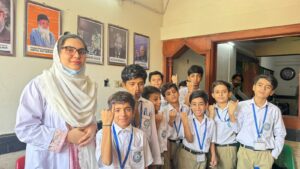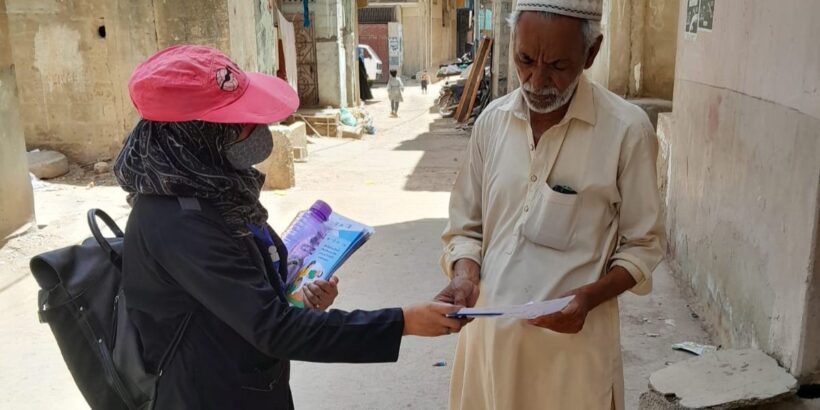Despite the proven success of vaccination programs to reduce disease burden and eliminate certain diseases, Pakistan continues to struggle with vaccine hesitancy. The latest typhoid conjugate vaccine (TCV) campaign, held in May 2024, proactively identified numerous challenges during the pre-campaign phase and developed strategies for mitigation so that immunization activities went smoothly.
PHC Global’s field associates worked with the provincial vaccination teams to prepare microplans to reach missed children and vulnerable communities and designed an outreach and mobilization strategy to raise awareness and optimize vaccine coverage. The team strongly believed ‘the higher awareness, the higher vaccination coverage.’
Increasing awareness to increase vaccination coverage
Along with vaccine coverage, the project aimed to connect people with the health system to build trust by responding to questions about the campaign, disease, vaccine, and to dispel misinformation. Field associates assessed the knowledge level of the local stakeholders and shared information relevant to a particular person or family. Asia Tabassum, a Field Associate from District West Karachi, explained typhoid to the community members based on their level of understanding. In a telephonic interview, Tabassum shared, “To eighth grade children, I would explain the process through which bacteria spreads in the body as they were already studying biology.” To others she would explain how 90% of Karachi’s water is contaminated and typhoid is caused by bacteria that transfers through water.
It is important for people to get their children vaccinated. Depending on her audience, Tabassum shared information on symptoms of typhoid to help them recognize any individual in their neighborhood and community who may have experienced typhoid. This helped community members understand the severity of typhoid and many accepted TCV for their children.
Another communication strategy was to identify pockets of populations that were hesitant, resistant, or refusing, and adjust the messaging accordingly. This meant deciding how to deliver the information and determining the messenger. The chosen messenger depended on whether the community was receptive to messages from healthcare workers, a political leader, a religious leader, or someone else influential within the community.

Adapting outreach strategies to increase vaccine acceptance and uptake
Trust is an important factor when working with vaccine-hesitant families. It appeared that community members were less receptive to strangers encouraging them to vaccinate their children. This is where the community leaders and influencers really helped. The influencer may vary—a minister, a council person, a political person, an elder of the community, a religious leader, teacher or a well-known community local person—yet it is a person with whom there is trust. During the recent TCV campaign in Sindh, Pakistan, PHC Global field staff communicated the importance and purpose of the vaccine to these leaders, who then spoke with members of their community on the benefits of vaccination. With their support, families who refused to answer the door eventually agreed to have their children vaccinated.
Akmal Saeed, a Field Associate at District West Karachi shared that when going into certain communities, women did not answer the door in the absence of males. The male members of the household were at work when the vaccination team visited. In the evening, Akmal visited the rickshaw stands to communicate with the male family members and acquired their permission to vaccinate the children. The next day, the healthcare workers visited the neighborhood again, successfully vaccinating the children.
Another field associate, Shakeel from District Korangi, reported a similar challenge. He was always on the lookout to speak with males to talk to as he believes that a face-to-face conversation always helps to answer questions and ultimately gain agreement for vaccination.
When caregivers believed that sickness and health are in hands of God and so vaccines are not needed, Shakeel drew examples from their lives and asked, “Do you use mosquito coil or mosquito repellent?” The person said yes. Shakeel replied “Why do you use these before the mosquito bites?” The person laughed and was convinced for vaccination.
Language barriers were one of the prominent community challenges to improved vaccination coverage. Shakeel notes that “there should be more local females from the area who speak their language engaged in the campaign.” He adds that people are hesitant to get their young girls vaccinated by men, so females who speak the local dialect can help share information and vaccinate a child. The PHC Global staff engaged local medical doctors who explained the seriousness of typhoid and the impact of TCV in local languages.
In another area, the team identified 97 people who refused the vaccine due to religious reasons. The team conducted one-on-one sessions, inviting 15 individuals who refused the vaccine and 5 individuals who accepted the vaccination for their children to share their experiences. Those who had accepted the vaccine assured their peers that their children are safe and healthy after receiving the vaccine. Out of the 97, the team successfully covered 90 people.
With these specific interventions to increase vaccine uptake, the field staff made additional efforts to maximize vaccine coverage by making mosque announcements, special announcements in Friday prayer congregations, as well as approaching food cart sellers to use their megaphones to make campaign announcements.
Patience, consistency, and perseverance are key to successful vaccination campaigns
The campaign’s overall success was dependent on effective communication and consistent engagement with the community. It is important to understand personal and individual concerns and respond to them patiently with accurate information. A PHC Global field associate reported spending 3 hours with a parent to convince them for vaccination. At the end of the day, it was time well spent because the caregiver allowed the child to be vaccinated, ultimately protecting them against typhoid.
Cover photo: A field associate sharing information typhoid and TCVs. Credit: PHC Global.



